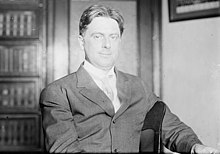William S. Bennet
| William Stiles Bennet | |
|---|---|
 |
|
| Member of the U.S. House of Representatives from New York's 17th district |
|
|
In office March 4, 1905 – March 3, 1911 |
|
| Preceded by | Francis E. Shober |
| Succeeded by | Henry George, Jr. |
| Member of the U.S. House of Representatives from New York's 27th district |
|
|
In office November 2, 1915 – March 3, 1917 |
|
| Preceded by | Joseph A. Goulden |
| Succeeded by | Charles B. Ward |
| Member of the New York State Assembly from the 21st district |
|
|
In office January 1, 1901 – December 31, 1902 |
|
| Preceded by | Edward H. Fallows |
| Succeeded by | Frederick E. Wood |
| Personal details | |
| Born |
November 9, 1870 Port Jervis, New York |
| Died |
December 1, 1962 (aged 92) Central Valley, New York |
| Citizenship |
|
| Political party | Republican |
| Spouse(s) | Gertrude Witschief Bennet |
| Alma mater | Albany Law School |
| Profession |
lawyer politician |
lawyer
William Stiles Bennet (November 9, 1870 – December 1, 1962) was an American politician and a U.S. Representative from New York, and father of Augustus Witschief Bennet.
Born in Port Jervis, New York, Bennet was the son of James and Alice Leonora (Stiles) Bennet and attended the common schools. He graduated from Port Jervis Academy, Port Jervis, New York, in 1889; and from Albany Law School, Albany, New York, in 1892. He married Gertrude Witschief, on June 30, 1896.
Bennet was a lawyer in private practice, and an official reporter of the Orange County Board of Supervisors from 1892 to 1893. He was a member of the New York State Assembly (New York County, 21st District) in 1901 and 1902. He served as justice of the municipal court of New York, New York, 1903. He served as member of the United States Immigration Commission from 1907 to 1910, and was one of two (of fourteen) members that generally opposed the restriction of immigration. He served as delegate to the Republican National Convention in 1908 and 1916. Bennet also spoke out against the denial of civil rights to African Americans in southern states, noting that those states benefited from greater representation because of the size of their black population but prevented those black citizens from voting.
Elected as a Republican to the Fifty-ninth and to the two succeeding Congresses, Bennet served as U. S. Representative for the seventeenth district of New York from March 4, 1905 to March 3, 1911. An unsuccessful candidate for reelection to the Sixty-second Congress in 1910, he was elected to the Sixty-fourth Congress to fill the vacancy caused by the death of United States Representative Joseph A. Goulden of the twenty-seventh district of New York and served from November 2, 1915 to March 3, 1917. He was an unsuccessful candidate for reelection to the Sixty-fifth Congress in 1916.
...
Wikipedia
